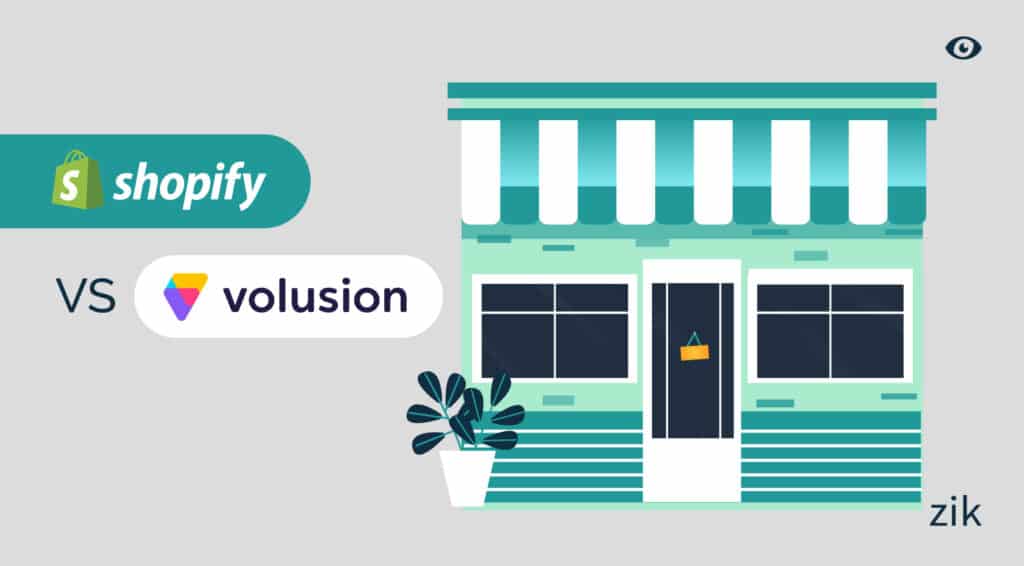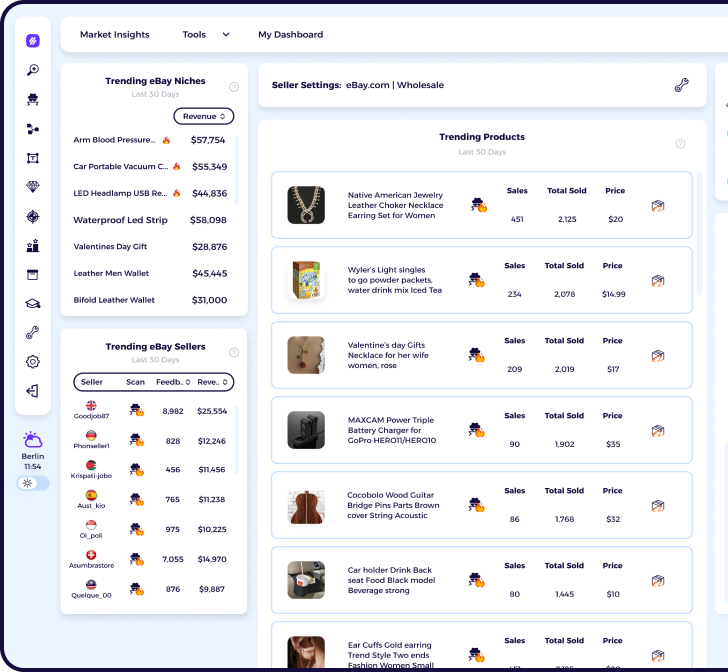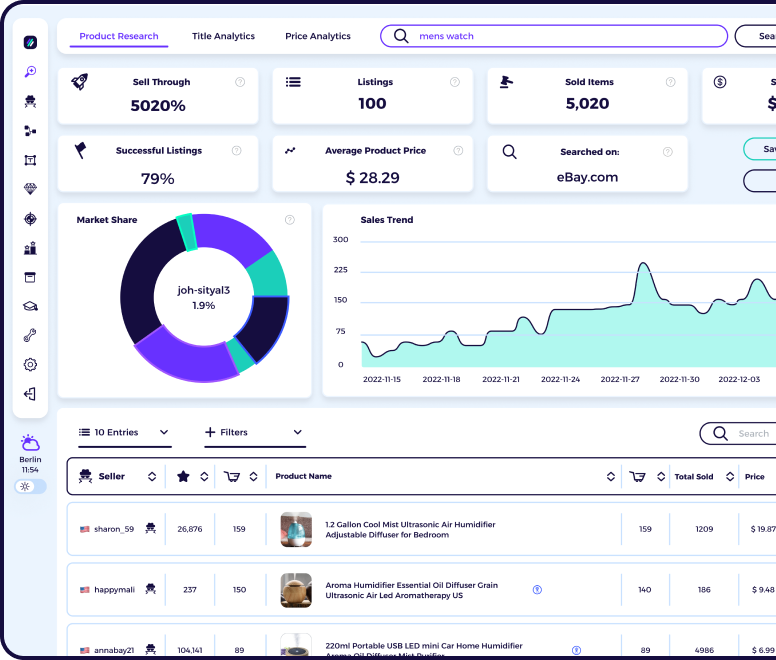Do you want to build an online store but are unsure which ecommerce platform to use?
Enter this head-to-head comparison and detailed guide of Shopify vs Volusion. These two hosted ecommerce platform options differ in many ways, although they have overlapping features. Hence, this has led to confusion in many aspiring online store owners about which platform reigns supreme.
If you’ve searched far and wide for information that will help you decide the better of the two: Volusion vs Shopify, your search ends here. Choosing between them is not simple, but you can only determine the best choice if you have information about each platform.
So, let us settle the debate. Which ecommerce platform is better: Volusion vs Shopify?
Keep reading so you can pick what’s best for you!
Article Overview:
Volusion vs Shopify – An Overview
Volusion vs Shopify: Head-to-Head Comparison
Volusion vs Shopify Pricing
User-Friendliness
Web Design Templates
Volusion vs Shopify SEO Features
Volusion vs Shopify Transaction Fees
Volusion vs Shopify Online Store Management
Which Website Builder is Right for You?
Volusion vs Shopify – An Overview
Before we get down to the nitty and gritty, let’s first familiarize each of these potential platforms for your ecommerce store.
Both Shopify and Volusion are ecommerce platforms that allow you to build an ecommerce store. They are similar because they are a hosted ecommerce platform. So, what does a ‘hosted’ platform mean?
Whether you use Volusion vs Shopify, you won’t need to buy your own hosting. The online store is hosted from a web browser. There is also no need to install additional software to get your online store up and running.
According to the Volusion website, it is an all-in-one ecommerce solution. It is cloud-based and hosted, making it easy for beginners to build an ecommerce website without prior experience. Volusion was founded in 1999, which means it has been around way before Shopify was even around. The website founder was Kevin Sproles, who developed an all-in-one platform with hosting capabilities and the functionalities required to create an ecommerce store (such as a virtual shopping cart).

Since its founding, there are over 185,000 Volusion stores that were built. The initial release of the Volusion platform was called V1, which was eventually updated to the Volusion-2 version. The latter version addressed the initial inefficiencies of the first version, which included speed issues and a lack of simplicity.
Since then, Volusion is a notable hosted ecommerce platform and website builder. It offers a simple solution for online store builders and owners looking to create, host, manage, and grow their ecommerce website.
On the other hand, Shopify is a familiar name when discussing a website builder with ecommerce capabilities. Shopify offers some of the best ecommerce solutions available, making it the leading choice for creating an online store. While Volusion launched way before Shopify, the latter offers a comprehensive ecommerce platform solution at reasonable packages.
Shopify was founded in 2006, but it has rapidly outdone Volusion regarding the volume of its user base. Now, millions of online stores are supported and hosted by Shopify globally. They have various packages available, whether you’re a startup or looking to scale your ecommerce businesses.

If you’re looking for the best website builder and want to compare Volusion vs Shopify, you’ll get a more in-depth look at the top Shopify and Volusion features to help you decide.
Volusion vs Shopify: Head-to-Head Comparison
Volusion vs Shopify Pricing
Before knowing about the Shopify and Volusion features, starting with the pricing plans is important. You must determine what you can afford before diving into the detailed list of features. It’s especially crucial if you’re a startup business with a limited budget. But even established ecommerce businesses are looking for solutions to maximise profit.
First, both Shopify and Volusion offer a free trial version that won’t require you to provide credit card details. It’s a major plus if you’re new to using each ecommerce platform and want to test the features before fully committing to a fixed pricing plan.
Shopify offers three basic pricing plans and two alternative plans for those e commerce store owners looking for more options. Here are the Shopify plans available:

- Basic – It is ideal for individuals and small ecommerce businesses. Pricing starts at $25 per month.
- Shopify – It is ideal for small businesses that require professional reporting. Pricing starts at $5 per month.
- Advanced – It is ideal for medium to large ecommerce businesses. Pricing starts at $399 per month.
On the other hand, Volusion offers four pricing plans, which are detailed below:

- Personal – $35 per month
- Professional – $79 per month
- Business – $299 per month
- Prime – Pricing depends on the extent of the ecommerce solution required.
Both Shopify plans and the Volusion pricing plans offer discounts if you choose the annual subscription. Shopify offers a 25% discount on annual subscriptions, while Volusion offers a 10% discount.
Upon first glance, you will notice immediately that Volusion is more expensive than Shopify (except for the higher Shopify plans). But the face value cost of the ecommerce store subscription is not the true measure of value and cost-effectiveness. Therefore, it depends on your needs and the features available for each plan within your budget.
User-Friendliness
A website builder and ecommerce platform is designed to make it easy to set up an online store from scratch. Therefore, it’s an important point of contention when choosing between Volusion vs Shopify.
Both Volusion and Shopify are fairly simple to use and navigate, even for those new to building online stores. The Volusion dashboard is straightforward and has a handy step-by-step wizard to guide them through the process.

Even for an experienced web designer, the ease of use of the Volusion dashboard is a welcome change. The only hiccup with setting up your online stores with Volusion is that you must input your credit card details at the final step before proceeding. But once you provide the necessary information, you can use the website builder and Volusion features.
The website builder is a well-built tool that suits beginner and experienced web designers. The process of building your online store is intuitive and fun. The only downside to the Volusion dashboard is that the design is overly simplified. While it is helpful for beginners to access the information from the dashboard, it can be slightly overwhelming for a beginner. In this regard, there is a bit of a learning curve involved.
On the other hand, the ecommerce functionalities on the Shopify platform is exceptionally easy to use. You can easily explore the tools and features even without coding knowledge. You don’t need experience or knowledge in web design to create an online store because the Shopify platform is simplified and organized.

But even so, Shopify offers a free informative guide to help you set up your e commerce store upon signing up. You can refer to this when you have questions about the website development process to proceed confidently. Shopify offers a neat feature wherein you can preview the storefront customizations you’ve done, so you can get a better idea of how the various elements on your online store work together once you publish it live.
Web Design Templates
When choosing between Volusion vs Shopify, you must look at the available web design themes.
Sure, Volusion offers a website builder functionality that lets you create your ecommerce website from scratch. Thankfully, you won’t need to since they offer various Volusion themes to make it even easier.

You can choose from up to 45 premium Volusion themes. You can also choose from 11 free Volusion themes on a tight budget. However, you can expect more limitations to the aesthetic value and customization that you can incorporate into your store with the free versus paid Volusion themes. The premium themes range from $50 to $180.
Meanwhile, Shopify themes are as straightforward as Volusion’s. But Shopify offers more themes to choose from – 61 in total. You can get 51 premium Shopify themes and 10 free ones. Even the free themes are professional-looking, so they should help you build a decent online store. But here’s the thing: Shopify themes are a bit pricier. The premium themes start at $140 and could go up to $300 per theme.

Initially, the Shopify themes seemed more costly. But the aesthetic and professionally designed themes are worthwhile because you only need a few tweaks and can launch your website immediately. The premium themes are suited for dynamic businesses that want to showcase their products or services to attract more customers.
But unlike Shopify, Volusion offers customization that entails some more advanced website editing skills than most newbies have. Of course, you can use HTML and CSS coding to customize your Shopify themes when building your Shopify sites, but Volusion features a more complex customization process. Shopify users prefer the ecommerce platform for this particular reason.
Volusion vs Shopify SEO Features
Business owners looking for the best ecommerce solutions must also consider the SEO tools and features available on the chosen platform. Volusion and Shopify equip users with adequate SEO tools to optimize their ecommerce website performance.
Shopify’s SEO tools and tweaking abilities are far more comprehensive than Volusion’s. You can tweak the page title, URL, image alt text, meta descriptions, etc., which makes it on par with other advanced ecommerce solutions.
On the other hand, Volusion comes with basic SEO features and capabilities. But the amount of SEO tools and capabilities at your disposal is more limited than what Shopify offers. The SEO tools allow you to tweak the SEO for the home page but not the static pages. Fortunately, you can use the SEO tools on Volusion to optimize the individual product pages.

Another one of the SEO features where Shopify excels over Volusion is the 301 redirects. Shopify handles this process better than Volusion does. While many other ecommerce solutions offer the same approach as Volusion, Shopify is one step ahead, making it a leading ecommerce platform online.
Apart from the SEO and marketing tools available on Volusion and Shopify, it is also an excellent idea to employ advanced product research and SEO tools. You can use these tools to identify the top trending products within your niche and the top keywords to target for maximum reach and to rank higher on search engines. Some tools even allow you to do competitor analysis, which makes Volusion and Shopify a complete marketing solution for your online store, not just an SEO tool.
Volusion vs Shopify Transaction Fees
How much does Volusion vs Shopify cut from every sale on your store?
It’s crucial to consider when choosing the best hosted ecommerce platform for your business. For the Volusion and Shopify ecommerce solutions, you are already paying a monthly fee, so make sure to weigh in the added transaction fees so you know how much profit you make.
Unsurprisingly, the Shopify fees are much higher than the Volusion transaction fees. However, the transaction fees for both Shopify and Volusion vary according to your subscription level.
For example, the transaction fees for the Volusion Personal plan are 1.25% for each transaction. The transaction fees drop to 0.65% and 0.35% for the two higher subscription plans. US-based Volusion merchants can waive the transaction fees if you use Volusion’s payment processor: Volusion Payments. But if you are a merchant outside the US, you cannot avoid these transaction fees.
With Shopify, the Starter plan has a transaction fee of 5%. But the Shopify Basic plan charges 2% on each transaction. The Shopify and Advanced plans are 1% and 0.5%, respectively. There is a way to avoid the Shopify transaction fees: using the platform’s payment processor, Shopify Payments. Some perks to choosing payment gateways from Shopify include multi-currency selling (ideal for businesses with international selling).
Volusion vs Shopify Online Store Management
Your work does not end when you build your website and publish it live. Ensure your chosen ecommerce platform provides efficient online store management solutions to help your business grow.
As an e commerce platform, Volusion features several powerful ecommerce tools to help manage your online store. It starts with the inventory management system that offers CSV file import and export functionality. You can also tweak other features within this e commerce platform you won’t find in other online store builders, such as tweaking the shipping variables, dropshipping, and automatic shipping and tax calculations.
Shopify is also impressive as an e commerce platform with its online store capabilities. You have an unrestricted product list when you upload your products to your online store. Plus, you can incorporate high-res images and flexible product variables. You can also customize the product descriptions and incorporate augmented reality features to make the customer shopping experience highly immersive. If you leverage these tools correctly, you can increase customer satisfaction and reduce product return rates.
You can tap into other Shopify ecommerce tools such as abandoned cart recovery, third party apps integration, order management, and customer segmentation. Take advantage of these Shopify ecommerce tools to generate more sales.
Which Website Builder is Right for You?
Using the facts presented here, you’re in a much better position to choose between Shopify vs Volusion.
When you look at these features, Shopify gets the upper hand in this head-to-head battle. You have an unrestricted product list, meaning you can sell anything on Shopify (including digital products). You also have more Shopify themes available, giving your store a more customized look, and making it easier to stand out. Other reasons why Shopify is the clear winner include the ability to sell in multiple currencies, wider third party apps integration, stronger SEO tools and features, and POS functionality.
On the other hand, choose Volusion if you want to take advantage of its cheaper transaction fees and no limitations on product variants that you can list on your store.
Want to review our other Shopify comparison articles?
Check out our comparisons of Shopify vs:






